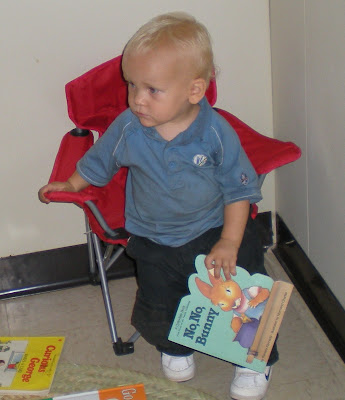 This first workshop is taking place in the middle of an Mbugwe village. You can see houses and fences in the background.
This first workshop is taking place in the middle of an Mbugwe village. You can see houses and fences in the background. The church that we visited had one of the largest church buildings in the area. It is built of bricks with a dirt floor and a metal roof. The windows and doorways are openings in the walls.
The church that we visited had one of the largest church buildings in the area. It is built of bricks with a dirt floor and a metal roof. The windows and doorways are openings in the walls. We sat in the back so that we would not distract people during the sermon. Here is shot looking forward in the building before everyone had arrived.
We sat in the back so that we would not distract people during the sermon. Here is shot looking forward in the building before everyone had arrived.
Eventually the pews became filled until there was standing room only. This shot shows Julia sitting on the women's side of the aisle. The ladies helped out by holding Daniel during the church service.

Worship was lively. Lots of hymns were sung accompanied by a battery powered keyboard. One of the local pastors preached a sermon in Swahili. Even though the audience was almost 100% Mbugwe, the hymns and scriptures are in Swahili, so the sermons are in Swahili. Comprehension of Swahili varies widely, and any one of these folks would find it far easier to understand the sermons and biblical concepts if they were presented in Mbugwe. Below a line of dancers enters in for a special period during the worship where the singing was in Mbugwe and traditional dancing was performed. It was a treat for everyone. The crowd loved it.

The striped sticks are used a lot. I asked how they were made. The bark is removed from slender poles. The stripes are burned by holding a hot iron against the stick while rotating it.



Barbara and I are sorry that we forgot to bring our video camera that day. The still shots cannot convey all the movement and sound. The Mbugwe have a particular dance where they gather in a circle facing each other and bend at the waist while undulating their shoulders. There is a still shot of that below.

Near the end of the service, Barbara, Samuel, and I were asked to step up to the front. We were given gifts and many kind words were spoken. Julia translated.

In the shot below, we posed with a couple of the pastors. Folks had come from a number of different villages to attend. I was asked if I wanted to say a few words. Fortunately, I had seen one lady wearing a T Shirt that had "Jesu ni Bwana" on it. I knew bwana was a word like boss or lord. So I was able to call out "Jesus is Lord" in Swahili. Julia had learned a few words of Mbugwe, so she thanked the congregation in Mbugwe. That was a big hit.
 After the service we were treated to a dinner of rice with stew on it and bottes of soda. We sat on folding chairs with a number of the local pastors. For Sam, Barbara, and I the language barrier was a bit of problem. But Julia was able to translate back and forth between Swahili and English.
After the service we were treated to a dinner of rice with stew on it and bottes of soda. We sat on folding chairs with a number of the local pastors. For Sam, Barbara, and I the language barrier was a bit of problem. But Julia was able to translate back and forth between Swahili and English. It was great to be able to actually meet a representative group of the people to whom Viggo and Julia will be pouring out their lives. Active Christians are a minority among the 25,000 or so Mbugwe people. So the translation work will be important for the churches, but it will also be very important for enabling evangelism. Wycliffe often works with the translators to supply literature and films, such as the Jesus film, in the local language as the translation progresses.
It was great to be able to actually meet a representative group of the people to whom Viggo and Julia will be pouring out their lives. Active Christians are a minority among the 25,000 or so Mbugwe people. So the translation work will be important for the churches, but it will also be very important for enabling evangelism. Wycliffe often works with the translators to supply literature and films, such as the Jesus film, in the local language as the translation progresses.















 That's BBQ sauce and a little pile of salt on the plate next to the meat.
That's BBQ sauce and a little pile of salt on the plate next to the meat.





























